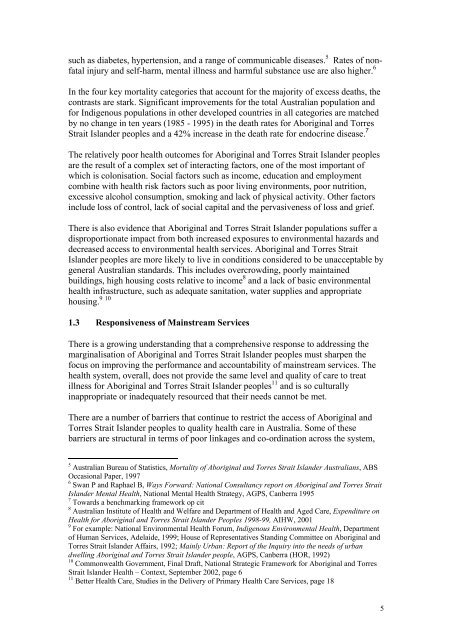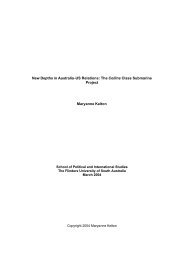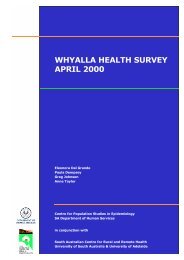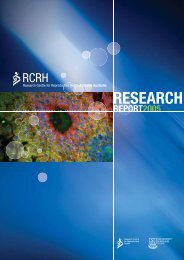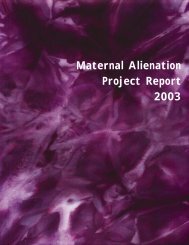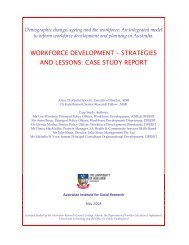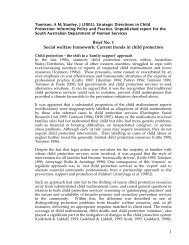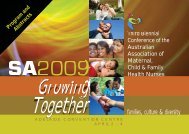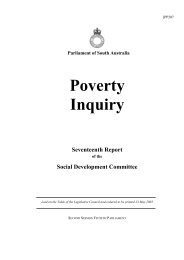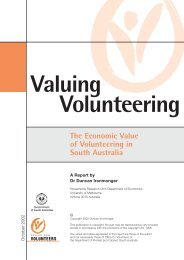cultural respect framework cultural respect framework - SA.Gov.au
cultural respect framework cultural respect framework - SA.Gov.au
cultural respect framework cultural respect framework - SA.Gov.au
- No tags were found...
You also want an ePaper? Increase the reach of your titles
YUMPU automatically turns print PDFs into web optimized ePapers that Google loves.
such as diabetes, hypertension, and a range of communicable diseases. 5 Rates of nonfatalinjury and self-harm, mental illness and harmful substance use are also higher. 6In the four key mortality categories that account for the majority of excess deaths, thecontrasts are stark. Significant improvements for the total Australian population andfor Indigenous populations in other developed countries in all categories are matchedby no change in ten years (1985 - 1995) in the death rates for Aboriginal and TorresStrait Islander peoples and a 42% increase in the death rate for endocrine disease. 7The relatively poor health outcomes for Aboriginal and Torres Strait Islander peoplesare the result of a complex set of interacting factors, one of the most important ofwhich is colonisation. Social factors such as income, education and employmentcombine with health risk factors such as poor living environments, poor nutrition,excessive alcohol consumption, smoking and lack of physical activity. Other factorsinclude loss of control, lack of social capital and the pervasiveness of loss and grief.There is also evidence that Aboriginal and Torres Strait Islander populations suffer adisproportionate impact from both increased exposures to environmental hazards anddecreased access to environmental health services. Aboriginal and Torres StraitIslander peoples are more likely to live in conditions considered to be unacceptable bygeneral Australian standards. This includes overcrowding, poorly maintainedbuildings, high housing costs relative to income 8 and a lack of basic environmentalhealth infrastructure, such as adequate sanitation, water supplies and appropriatehousing. 9 101.3 Responsiveness of Mainstream ServicesThere is a growing understanding that a comprehensive response to addressing themarginalisation of Aboriginal and Torres Strait Islander peoples must sharpen thefocus on improving the performance and accountability of mainstream services. Thehealth system, overall, does not provide the same level and quality of care to treatillness for Aboriginal and Torres Strait Islander peoples 11 and is so <strong>cultural</strong>lyinappropriate or inadequately resourced that their needs cannot be met.There are a number of barriers that continue to restrict the access of Aboriginal andTorres Strait Islander peoples to quality health care in Australia. Some of thesebarriers are structural in terms of poor linkages and co-ordination across the system,5 Australian Bure<strong>au</strong> of Statistics, Mortality of Aboriginal and Torres Strait Islander Australians, ABSOccasional Paper, 19976 Swan P and Raphael B, Ways Forward: National Consultancy report on Aboriginal and Torres StraitIslander Mental Health, National Mental Health Strategy, AGPS, Canberra 19957 Towards a benchmarking <strong>framework</strong> op cit8 Australian Institute of Health and Welfare and Department of Health and Aged Care, Expenditure onHealth for Aboriginal and Torres Strait Islander Peoples 1998-99, AIHW, 20019 For example: National Environmental Health Forum, Indigenous Environmental Health, Departmentof Human Services, Adelaide, 1999; House of Representatives Standing Committee on Aboriginal andTorres Strait Islander Affairs, 1992; Mainly Urban: Report of the Inquiry into the needs of urbandwelling Aboriginal and Torres Strait Islander people, AGPS, Canberra (HOR, 1992)10 Commonwealth <strong>Gov</strong>ernment, Final Draft, National Strategic Framework for Aboriginal and TorresStrait Islander Health – Context, September 2002, page 611 Better Health Care, Studies in the Delivery of Primary Health Care Services, page 185


